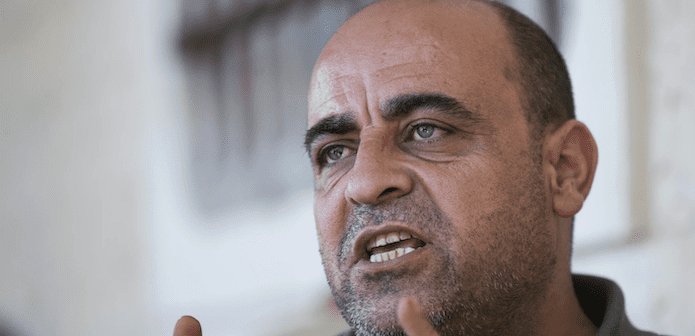Killed by Palestinian Authority for opposing its tyranny, Banat supported brutal Assad
Arab intellectuals face a conundrum. They defend democracy and freedom, only to find out that most democracy and freedom Arab activists are neither democratic nor freedom-loving.
During the Gaza 2021 War, many protesters showed up to pro-Hamas rallies wearing shirts with the picture of late Iraqi tyrant, Saddam Hussein, imprinted on them. Others came to the rallies with pictures of Syrian brutal dictator Bashar Assad. Such banners begged the question: How can those who support Arab tyrants and autocrats demand freedom for Gaza? How can many Palestinians claim victimhood and ask for global solidarity and support, when these same Palestinians support human beasts like Saddam and Assad.
In 2017, Israel arrested teenager Ahed Al-Tamimi, causing a global uproar. Released shortly after, Al-Tamimi and her dad appeared in videos praising Assad and Hezbollah chief Hassan Nasrallah.
This week, the West Bank’s Palestinian Authority (PA) arrested Nizar Banat, an outspoken dissident. His dead body was later found, abandoned. As usual, whenever in trouble, blame Israel. For a few days, the Palestinian media blamed “Israeli settlers” for Banat’s death, but it later turned out that it was the PA that killed him. Thus, angry protesters took to the streets to denounce his death.
Every death is regrettable, including that of Banat. But when surveying his Twitter feed, activists found out that in 2018, this Palestinian victim of the PA was cheering for Assad’s “heroic troops,” threatening Syrians of the northern city of Idlib — who live outside government control — that Assad’s forces were preparing to invade and “burn down” their city. “Your bark will be heard in heaven,” Banat wrote. “Let America come help you,” he added.
Many Arab human rights activists are not really interested in freedom or democracy, but only in using freedom and democracy against their enemies. When they win, these activists proclaim freedom and democracy a colonial construct imposed on indigenous populations, as they take power and embark on building their own dictatorship.
The same problem happened during the Arab Spring. Most Arab intellectuals took the side of change, and supported replacing long-ruling autocrats with democracy. Problem is, democracy needs democrats and, in Arab countries, there were very few of them. In place of Egypt’s Hosni Mubarak, the Islamist Muhammad Morsi was elected president. But Morsi and his Muslim Brotherhood party quickly started changing the rules of the game and applying social engineering to further Islamize Egypt. They seemed unwilling to share power or ever leave it.
The election of another Islamist to power, Turkey’s Recep Tayyip Erdogan, has been also illustrative of how the Islamist rule of Egypt would have looked like had Morsi not been deposed. Erdogan has been Turkey’s effective ruler, in various capacities, since the 1990s. And he often changes the constitution to make his open-ended tenure look legal.
The problem for Arab intellectuals is that supporting change and democracy has taught them that change can happen, from time to time, but that tyrants will be only replaced by newer tyrants.
The Arab Spring has been a lesson that not all Arab “human rights activists” are actual human rights defenders, but merely little tyrants toying with Western ideas to force their rivals out, and become autocrats in their stead.
Until the Arabs show that a culture of freedom, democracy and tolerance has spread amongst them, it is well advised to take all Western-looking concepts — including elections — not to mean change, but to mean more of the same.
And until the Arab culture changes and internalizes the concepts of liberty, freedom and democracy, the second best choice would be to cheer for the enlightened despot who can grow the economy, live and let people live, instead of non-enlightened despots — usually Islamists but can be secular like Saddam and Assad — whose autocracy brings not only oppression, but also poverty, crime and civil wars.


And what about a democracy under military supervision, like Turkey before Erdogan? That might be more sustainable to accompany an incremental democratization process.